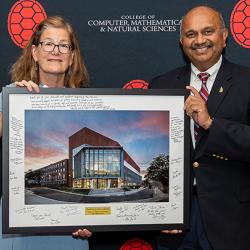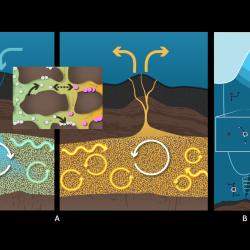Geology’s Vedran Lekic Receives Packard Fellowship
Vedran Lekic, assistant professor in the University of Maryland’s Department of Geology, has been awarded a Packard Fellowship for Science and Engineering from the David and Lucile Packard Foundation. The fellowship is one of 18 awarded this year nationwide and bestows unrestricted funds of $875,000 over a five-year period to the most promising early-career scientists and engineers.
“I am both delighted and humbled to be honored by my peers and the Packard Foundation,” said Lekic.
He will use the award to support his students and overall research program. Lekic explores the state, dynamics and dominant processes of the solid Earth, as well as those of other planets and satellites. His research efforts focus on developing new and better ways of analyzing and modeling seismic data, leading to improved understanding of Earth’s inner structure.
Lekic and his students are currently using recordings of ground vibrations to detect the scattering of seismic waves across the base of the North American tectonic plate. The data is collected by the National Science Foundation’s EarthScope Facility network, comprising 1,600 seismometers that measure ground vibrations from stations in all 48 contiguous states, Alaska and Puerto Rico, covering 3.8 million square miles. They are also developing methods to more accurately and efficiently extract information from seismic waves that pass through structures below the earth’s surface.
While a doctoral student, Lekic created a new global seismic velocity model that resulted in higher-resolution images of the Earth’s mantle structure. The model revealed key features that improved understanding of plate tectonics and continental evolution.
Lekic imaged the bottom of the North American tectonic plate across Southern California for his postdoctoral research. The resulting images mapped variations in plate thickness at unprecedented resolution and showed that thickness decreased abruptly within regions undergoing rifting, providing a new constraint for understanding a process that shapes continents.
In addition to seismology research, Lekic has also contributed to the new field of neutrino geoscience, which explores subatomic particles, called geo-neutrinos, emanating from the decay of radioactive elements deep within Earth’s interior.
In the past 18 months, Lekic received the Seismological Society of America’s 2013 Charles F. Richter Early Career Award, accepted a National Science Foundation Faculty Early Career Development Program award, and was named a 2014-2015 EarthScope Speaker.
Lekic earned his bachelor’s degree in astronomy and astrophysics and Earth and planetary sciences from Harvard University in 2004 and a doctoral degree in Earth and planetary science from the University of California, Berkeley, in 2009. In 2010-11, he was a National Science Foundation Earth Sciences Postdoctoral Fellow at Brown University’s Department of Geological Sciences. He joined the University of Maryland in 2012.
He joins five other faculty members who were named Packard Fellows while at UMD: Victor Muñoz (chemistry and biochemistry), William Pugh (computer science), Janice Reutt-Robey (chemistry and biochemistry), Sarah Tishkoff (formerly biology) and Victor Yakovenko (physics).
“The Packard Fellowships are an investment in an elite group of scientists and engineers who have demonstrated vision for the future of their fields and for the betterment of our society,” said Lynn Orr, Keleen and Carlton Beal Professor at Stanford University, and Chairman of the Packard Fellowships Advisory Panel. “Through the Fellowships program, we are able to provide these talented individuals with the tools and resources they need to take risks, explore new frontiers and follow uncharted paths.”
The Packard Foundation established the fellowships program in 1988 to provide early-career scientists with flexible funding and the freedom to take risks and explore new frontiers in their fields. Each year, the foundation invites 50 universities to nominate two faculty members for consideration. The Packard Fellowships Advisory Panel, a group of 12 internationally recognized scientists and engineers, evaluates the nominations and recommends fellows for approval by the Packard Foundation Board of Trustees. Since the program’s inception, the foundation has awarded $346 million to support 523 scientists and engineers from 52 top national universities.
About the Packard Fellowships for Science and Engineering
For 26 years, the Packard Fellowships for Science and Engineering program has awarded $346 million to support 523 scientists from 52 top national universities. It is among the nation's largest nongovernmental fellowships, designed with minimal constraints on how the funding is used to give the Fellows freedom to think big and look at complex issues with a fresh perspective. Packard Fellows have gone on to receive additional awards and honors, including the Nobel Prize in Physics, the Fields Medal, the MacArthur Fellowships, and elections to the National Academy of Sciences and the National Academy of Engineering. Visit the Packard Fellowships for Science and Engineering webpage to learn more about the program and watch a video about the Fellowships.







